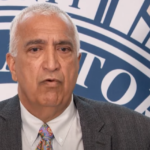
The Ksi Lisims LNG terminal, planned for the northwest coast near Prince Rupert, faces strong opposition from five First Nations whose territories would be affected by the project and its associated Prince Rupert Gas Transmission (PRGT) pipeline. The Gitanyow, Lax Kw’alaams, Metlakatla, Kitsumkalum, and Haida Nations have all refused consent for the massive industrial development.
Tara Marsden, Wilp Sustainability Director for the Gitanyow Hereditary Chiefs, emphasized the broader implications: “It’s not just about one Nation wanting to have economic self-determination. They have to be responsible and accountable to others.” The Gitanyow Nation was forced to pursue legal action after being systematically excluded from environmental assessment processes—a lawsuit they ultimately lost, leaving their concerns about salmon habitat destruction effectively dismissed.
Despite this widespread Indigenous opposition, Premier Eby declared the project will proceed regardless, stating: “We have to move these projects. They are on fixed timelines.” This approach represents a troubling selective consultation process that prioritizes the economic interests of the supportive Nisga’a Nation while overriding the territorial rights and environmental concerns of multiple other Indigenous communities.
American Corporate Control of Canadian LNG Resources
Perhaps more damaging to Eby’s progressive credentials is the project’s ownership structure, which places Canadian natural gas resources under American corporate control. The Ksi Lisims LNG facility will be “constructed, owned and operated by wholly owned subsidiaries of Western LNG,” a Houston, Texas-based energy company with significant ties to the Trump administration.
Major financial backing comes from Blackstone Inc., whose CEO publicly endorsed Donald Trump and contributed substantially to his election campaign. Additional American investment comes from Jefferies Financial Group and other U.S.-based private investors, ensuring that profits from Canadian natural gas exports will flow primarily to American shareholders.
The irony is particularly stark given Eby’s public statements. While framing the project as preventing Trump from building “a dirty LNG facility on the coast of Alaska,” the Premier is actually facilitating American corporate control over Canadian energy resources. BC Green Party interim leader Jeremy Valeriote accurately characterized this as approving “a foreign-owned, foreign-built fossil fuel project that will enrich US billionaires while leaving British Columbians to bear the costs.”
Raw Resource Export Model Perpetuates Colonial Economics
The 12-million-tonne-per-year Ksi Lisims LNG export facility exemplifies Canada’s persistent role as a resource extraction economy serving foreign markets rather than developing domestic industrial capacity. Instead of building value-added processing industries that could create long-term employment and economic development in British Columbia, the province is facilitating the export of raw natural gas to Asian markets where other countries capture the benefits of downstream manufacturing and processing.
This approach perpetuates what critics describe as a colonial economic relationship—extracting resources for foreign corporate benefit while leaving Canadian communities to bear environmental risks, infrastructure costs, and limited economic returns. The project promises temporary construction jobs while shipping the real value-creation overseas to countries that will use Canadian natural gas to power their own industrial development.
Environmental Concerns Dismissed by BC Government
Environmental opposition to the Ksi Lisims LNG project extends beyond Indigenous communities to include mainstream environmental organizations and the BC Green Party. Jeremy Valeriote characterized the facility as a “30-megaton carbon bomb” that will cause “devastating and lasting harm to the environment.”
The project’s environmental assessment process has been particularly controversial, with multiple First Nations excluded from meaningful participation. Concerns about impacts on salmon habitat, particularly Sockeye and Chinook populations already in decline, have been largely dismissed in favor of economic projections that promise $17 billion in economic benefits over 30 years.
These economic projections fail to account for the opportunity costs of not developing domestic value-added industries, the long-term environmental costs, or the reality that most profits will flow to American shareholders rather than Canadian communities.
BC NDP’s Progressive Contradictions Exposed
Eby’s handling of the Ksi Lisims LNG decision reveals a broader pattern in contemporary Canadian politics where governments campaign on progressive values but govern according to traditional resource extraction imperatives when economic pressure mounts. The Premier’s willingness to override Indigenous opposition while facilitating American corporate control suggests that stated commitments to reconciliation and sovereignty remain conditional.
This contradiction is particularly significant for the BC NDP, which has built its political brand on Indigenous reconciliation, environmental protection, and economic nationalism. The party’s support for a project that contradicts all three of these principles demonstrates how deeply embedded traditional resource extraction politics remain in Canadian governance.
Alternative Path: Domestic Energy Security and Value-Added Processing
Rather than defaulting to the raw resource export model, British Columbia could pursue alternatives that would better serve both Indigenous rights and long-term economic development:
Domestic Energy Security: Using natural gas resources to support local industrial development rather than export, reducing dependence on volatile global energy markets while creating stable domestic employment.
Value-Added Processing: Developing downstream industries that capture the full economic value chain, from extraction through manufacturing, creating long-term, high-paying employment rather than temporary construction jobs.
Genuine Indigenous Partnership: Ensuring all affected First Nations have meaningful consent and partnership opportunities, not just those whose interests align with government priorities.
Renewable Energy Investment: Using resource revenues to accelerate the transition to renewable energy infrastructure rather than locking in decades of fossil fuel dependence.
Political Implications for David Eby and BC NDP
Eby’s decision on Ksi Lisims LNG will likely define his government’s credibility on Indigenous rights and economic sovereignty. By prioritizing American corporate interests over Indigenous opposition and Canadian resource sovereignty, he risks cementing British Columbia’s role as a resource colony rather than a self-determining jurisdiction.
The decision also creates political vulnerabilities for the BC NDP, potentially alienating Indigenous voters, environmentalists, and economic nationalists who expected different approaches from a supposedly progressive government. Opposition parties, including the BC Greens, are already using the contradiction to highlight the gap between NDP rhetoric and policy reality.
Conclusion: The Cost of Corporate Compromise
The Ksi Lisims LNG controversy demonstrates that Canada’s political establishment remains fundamentally committed to the colonial economic model, regardless of progressive rhetoric. When corporate profits and American investment interests conflict with Indigenous rights and Canadian sovereignty, the traditional power structure consistently prevails.
True progressive leadership would require the courage to reject projects that enrich foreign corporations at the expense of Indigenous rights and long-term economic development. Instead, Eby’s approach suggests that contemporary Canadian politics continues to disappoint those seeking genuine reconciliation and economic independence.
Until political leaders are willing to challenge the fundamental assumptions of resource extraction politics, Canadian sovereignty and Indigenous rights will remain subordinate to corporate interests—whether those corporations are based in Calgary, Houston, or New York.



